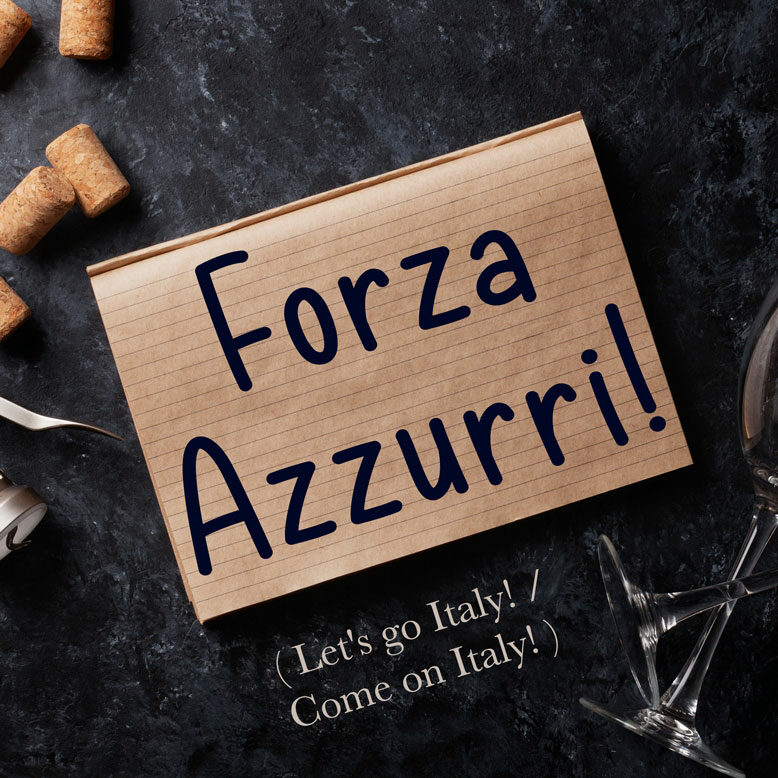We are officially a week into the UEFA Euro 2020 soccer tournament! It was originally scheduled for June – July 2020 but had to be postponed by a year due to the pandemic.
Italy’s national football team is known colloquially by its nickname Gli Azzurri which means The Blues. This is because Savoy blue is the common colour of all the national teams representing Italy.
Why does Italy wear blue, you might ask? Well, when Italy played its very first game back in 1910, the country was still under the Savoia monarchy, so they adopted the colours of the royal house rather than the tricolours of the Italian flag.

Learn with our video
According to the current FIFA World Rankings, Italy is currently 7th in the world, but they have occupied first place several times over the years.
If you are a fan of Italy and want to know how to cheer them on in the Italian language, you’ve come to the right place. Keep on scrolling to find out more!
Forza Azzurri!
Let’s go Italy! / Come on Italy!
The word forza in Italian literally means strength, but it can also function as an exhortation, much like the English expressions Come on! / Let’s go! / You can do it!

Forza is often combined with other exhortations such as dai and su which more or less mean the same thing. In fact, Italians often use all three together for emphasis:
Dai su, forza!
Come on!!
Sometimes, instead of the team name, you will hear Italians say ragazzi which in this context means guys.
Forza ragazzi! Ce la potete fare!
Come on, guys! You can do it!

And what about the rest of the year, when the national championships are over and done with? That’s when you’ll want to start cheering for one of the Italian football clubs! Some of the most popular include:
- Forza Juventus / Juve! = Let’s go Juventus! / Come on Juventus!
- Forza Milan! = Let’s go Milan!
- Forza Inter! = Let’s go Inter Milan!
When my husband was little, he recalls reading the magazine Forza Juventus, which was entirely dedicated to the Juventus team. You’ll also find countless banners, posters and other merchandise with Forza + the name of the team. And Italians also use it in conversation to make it clear who their favourite team is.
Oh mi raccomando, domani, Forza Toro! – Ma quale Toro! No, no! Domani, Forza Juve!
Hey remember, tomorrow, cheer for Turin! – Turin? What are you talking about? No, no! Tomorrow, cheer for Juve!

Important Italian Soccer Words:
- calcio = soccer / football (literally means “kick”)
- tifosi = fans / supporters
- Coppa del Mondo = World Cup
- pallone = ball (also soccer / football)
- portiere = goalkeeper
- giocatore = player
- arbitro = referee
- cartellino rosso / giallo = red / yellow card
- campo da calcio = soccer / football field
- gol = goal (also used with the English spelling)
- squadra = team
- stadio = stadium
- partita = match / game
- fallo = foul
- porta = goal post
- rigore = penalty
- calcio d’angolo = corner kick
- calcio di punizione = free kick
- cambio / sostituzione = substitution
- riserva = reserve player
This article is also available in video format on our YouTube channel. The audio version can be found on Podbean, Google Podcast, Apple Podcast and Spotify.
Heather Broster is a graduate with honours in linguistics from the University of Western Ontario. She is an aspiring polyglot, proficient in English and Italian, as well as Japanese, Welsh, and French to varying degrees of fluency. Originally from Toronto, Heather has resided in various countries, notably Italy for a period of six years. Her primary focus lies in the fields of language acquisition, education, and bilingual instruction.


